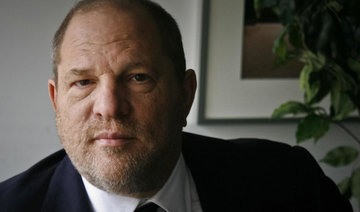LOS ANGELES: A golden statue of a bathrobe-clad Harvey Weinstein, seated regally atop a couch with an Oscar in hand, took up temporary sidewalk residence close to the site of Sunday’s Academy Awards.
“Casting Couch” is a collaborative work between a Los Angeles street artist known as Plastic Jesus and Joshua “Ginger” Monroe, designer of 2016’s nude Donald Trump statues placed in major US cities.
The life-sized Weinstein sculpture, displayed Thursday on Hollywood Boulevard, aims to spotlight the entertainment industry’s sexual misconduct crisis and the disgraced studio mogul’s role in it, Plastic Jesus said.
“There’s so much about Hollywood that’s great and celebrated in the Oscars, but there’s also this underbelly of darkness within the industry that we often sweep under the carpet or ignore,” said Plastic Jesus, formerly a London-based photographer.
The phrase “casting couch,” used to describe the demand of sexual favors for work, may seem a relic of a bygone era but is “still very much a part of the Hollywood culture,” he said.
Plastic Jesus said he and Monroe first considered a standing Weinstein statue but quickly decided to incorporate a chaise lounge. The project, made of fiberglass and acrylic resin, was in the works for two months.
It will be on display this weekend, weather permitting.
Visitors to the sculpture were sitting next to the faux Weinstein and taking selfies, turning it into an interactive installment, Plastic Jesus said.
It also expands the symbolism, he said.
“For many, many people, aspiring actors and actresses, that would have been their dream to be close to Harvey,” but that reality has proven a nightmare for some, the artist said.
Weinstein has been accused by dozens of women of sexual harassment or sexual assault, including rape. He’s denied all allegations of non-consensual sex, but apologized for “the way I’ve behaved with colleagues in the past.”
Plastic Jesus has created a series of Oscar-timed statues, including one last year of Kanye West in a crucified pose and titled “False Idol.”















